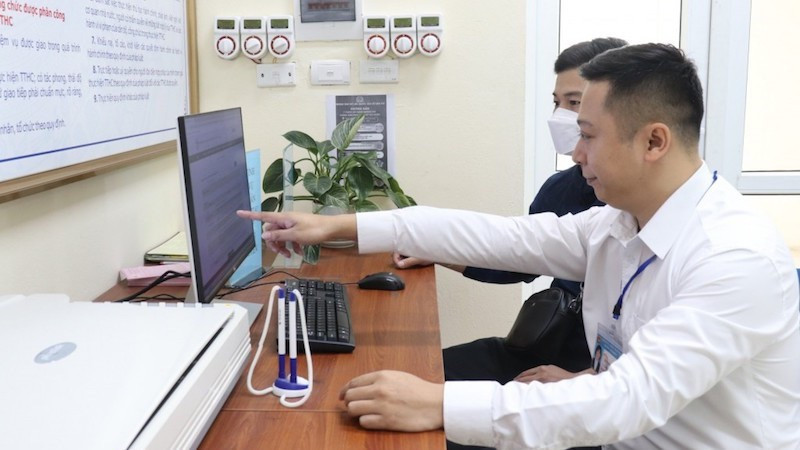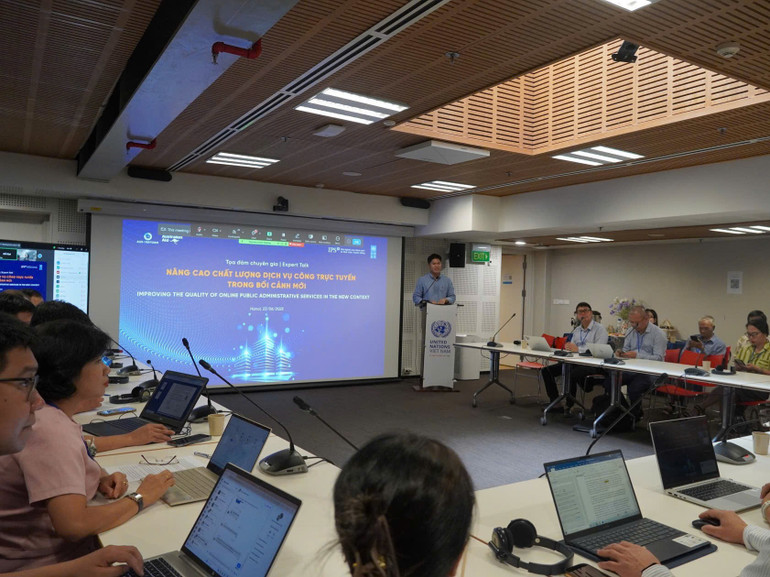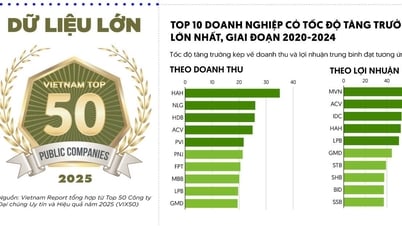
The Institute for Policy Studies and Media Development (IPS) and the United Nations Development Programme (UNDP) have just released a Report on Assessment of Provincial Online Public Services from the User's Perspective in 2025.
The report points out the remaining weaknesses to avoid repetition in the national public service platform, good models in localities that need to be developed, proposes a number of solutions and policy recommendations to contribute to improving the efficiency and user-friendliness of the national online public service delivery system with users as the center.
The report is very meaningful in the context that 2025 is a milestone in the process of digital transformation, institutional reform, and administrative reform in Vietnam with many changes related to the provision of online public services. This includes the consolidation of online public service provision platforms on the National Public Service Portal, localities not maintaining the interface of the provincial public service portal; preparing and initiating the 2-level local government model; reforming administrative procedures, reducing the burden on people and businesses is promoted.
Public service portals still have many points that need improvement.
According to the review results, most provincial Public Service Portals still show limitations in 4 groups of criteria: accessibility; procedure guidance and lookup features; support for procedure implementation and ensuring user rights.
Most administrative procedures still have to be done on computers. Many platforms are not optimized for mobile phones – the device that more than 95% of Vietnamese people use to access the Internet.
Even on the website interface, users still have to go through many steps when completing procedures, such as: downloading forms, filling them out by hand, scanning, taking photos to send back. In particular, some user groups such as people with disabilities, ethnic minorities, and the elderly have not yet accessed, used, or have difficulty performing administrative procedures on the Public Service portals.

Many online public service portals lack basic information about the responsible contact point for people to contact when needed. Despite improvements in feedback, users still have difficulty understanding the procedure processing process, reasons for delays, and are unclear about the main contact point responsible when problems arise.
Chatbots (automatic virtual assistants using artificial intelligence) can only answer simple questions and cannot support users in complex, real-life situations. Notably, the report shows that only the Nam Dinh Provincial Online Public Service Portal has a page loading speed of “Good”, the remaining provinces need to improve significantly.
According to the report, although 56/63 provinces and cities have smart applications, only 4/56 smart applications allow people to submit applications directly without navigating to the web interface. Only 2 smart applications allow citizens outside the province to submit applications: Hue-S and Thanh Hoa Public Services.
Through experience, most applications are not friendly to the visually impaired. The lack of deep integration of public service features makes smart applications not an effective channel for people to interact with the government.
The procedure is still confusing.
The report classifies administrative procedures into three groups based on their digitization capabilities. However, many administrative procedures that have not been digitized are still posted on the Online Public Service Portal, causing confusion for users.
In particular, complicated administrative procedures and processes are one of the root causes hindering the provision of effective and user-friendly online Public Services on Public Service Portals.
The report also raised a number of issues arising when merging provinces and implementing two-level local government regarding the consolidation of information systems, databases, workload, human resources to handle administrative procedures, etc.
Some recommendations
Continuing the recommendations made in 2024, the 2025 Report re-emphasizes the importance of "digital governance" thinking in developing and implementing policies related to Online Public Services.
The "digital governance" mindset implies the special importance of data, of sharing and connecting data between State agencies, and between State agencies and organizations and individuals using online public services. This mindset also requires interaction between the government and people on digital platforms, gradually reducing direct interaction between people in provision and use.
From the limitations pointed out on the Provincial Public Service Portals with 4 groups of criteria, the report recommends prioritizing the improvement of features and tools that meet the requirements: having a great impact on the rights and needs of the majority of users (for example, increasing the speed, time, and convenience of performing procedures); being relatively convenient in terms of technology and budget, within capacity (for example, shortening the steps in the internal processes of State agencies and between State agencies)...
The design of the National Online Public Service Portal should pay special attention to vulnerable groups. It is necessary to periodically review, detect and improve the level of friendliness towards people with disabilities, as well as user groups with similar needs such as the elderly and ethnic minorities.
It is necessary to ensure that the chatbot (if available on the National Public Service Portal in the near future) actually works, answers questions that require handling of real-life contexts, and provides immediate support to users in the process of providing online Public Services.

In addition, the report recommends classifying Online Public Services according to the digitalization capability of administrative procedures to restructure the implementation process in the electronic environment for essential and feasible administrative procedures.
For administrative procedures that are performed completely or almost directly, it is necessary to consider not posting them on the Online Public Service Portal, or if they are posted, it is necessary to clearly state the requirements for users on the reasons for performing the administrative procedure at the local reception and result return department, and have solutions to gradually switch to partially online implementation, towards full online implementation.
For administrative procedures that have reached the level of "complete digitalization", according to the "one-time only" principle, people and businesses only need to provide data to state agencies once; state agencies will proactively exchange and share data with each other when necessary, while ensuring full compliance with relevant legal regulations.
The report also proposes to complete and implement policies related to Online Public Services such as thoroughly applying "digital thinking"; simplifying administrative procedures and steps to implement administrative procedures; narrowing the "digital gap" in building the Public Service Portal and simplifying the process of implementing Online Public Services...
Along with infrastructure and institutions, staff capacity and communication work are important factors in implementing online public services. The report recommends that it is necessary to enhance the provision of knowledge and professional skills for staff, civil servants, public employees, and members of community digital technology teams.
Communication about Online Public Services needs to be strongly innovated, not only in writing but also using many images and instructional videos via social networks with content focusing on the benefits of Online Public Services for users such as: organizing competitions on ways and forms to overcome difficulties when building Online Public Services, especially for groups of people such as people with disabilities, the elderly, and ethnic minorities.
Source: https://nhandan.vn/danh-gia-dich-vu-cong-truc-tuyen-tu-goc-do-nguoi-dung-post889609.html


























































































Comment (0)